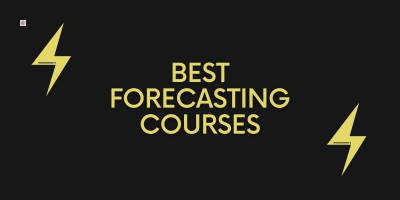Top 10 Best Online Philosophy Courses
Do you enjoy posing questions to the world? Or do you like to spend hours arguing your way through a problem through logic? A philosophy major is undoubtedly ... read more...ideal for you. However, contrary to popular belief, majoring in philosophy does not entail staring blankly into space and pondering some of life's most pressing topics. You will debate abstract and comprehensive problems and sort them using ethics and logic. As a philosophy major, you spend a lot of time reading, talking, and writing about your ideas. To satisfy the burgeoning demand for online yet qualifying courses, Toplist has complied a rundown of the Best Online Philosophy Courses offered by the prestigious universities, famous companies, top organizations and knowledgeable instructors across the globe for who in need!!!
-
What is philosophy, exactly? What distinguishes it from science, religion, and other forms of human communication? The foundations of philosophy in the Western tradition can be traced back to Ancient Greek thinkers in this course. The Presocratic natural philosophers, who lived in Ionia in the 6th century BCE and are credited with being the first scientists, are our starting point. Thales, Anaximander, and Anaximines made bold claims regarding reality's ultimate elements, whereas Heraclitus claimed that the shifting universe has an underlying order. Later Greek theorists (such as Anaxagoras and the atomist Democritus) attempted to respond to Parmenides of Elea's robust rejection to all of these suggestions.
Socrates emphasized the importance of the fundamental ethical question, "How shall I live?" in fifth-century Athens, and his pupils, Plato and Plato's pupil, Aristotle, built intricate philosophical systems to explain the nature of reality, knowledge, and human happiness. Epicureans and Stoics extended and altered Aristotle's previous legacy after his death in the Hellenistic period. All of these thinkers' major doctrines will be examined. Part I will focus on Plato and his forefathers. Aristotle and his successors will be discussed in Part II.
This course offers:
- Flexible deadlines: Reset deadlines in accordance to your schedule.
- Certificate : Earn a Certificate upon completion
- 100% online
- Beginner Level
- Approx. 15 hours to complete
- Subtitles: French, Portuguese (European), Portuguese (Brazilian), German, Russian, English, Spanish
Coursera Rating: 4.8/5.0
Enroll here: https://www.coursera.org/learn/aristotle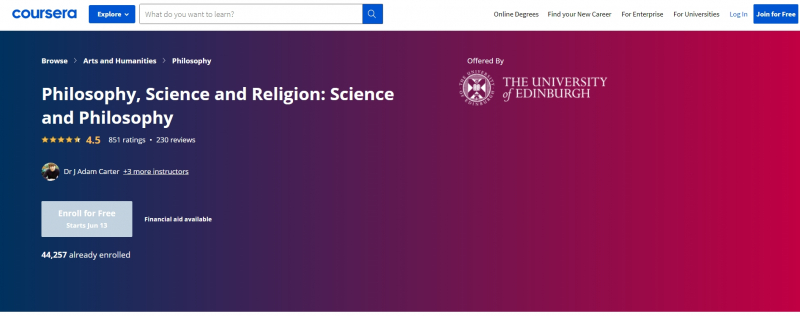
https://www.coursera.org 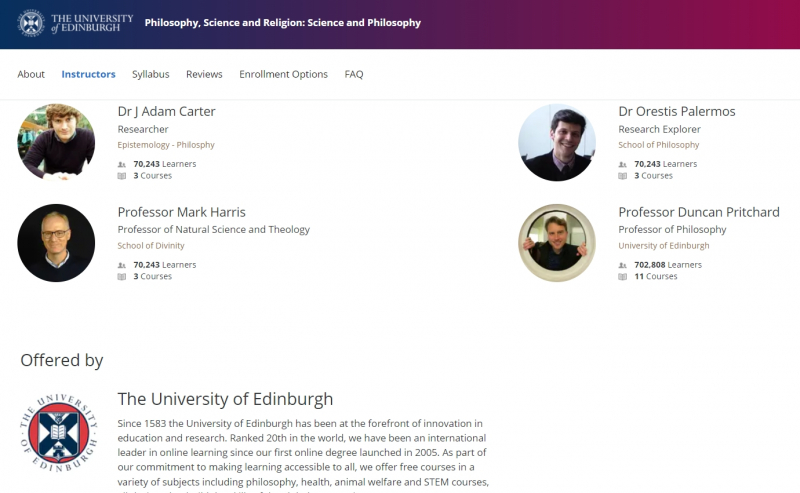
https://www.coursera.org - Flexible deadlines: Reset deadlines in accordance to your schedule.
-
What is philosophy, exactly? What distinguishes it from science, religion, and other forms of human communication? The foundations of philosophy in the Western tradition can be traced back to Ancient Greek thinkers in this course. The Presocratic natural philosophers, who lived in Ionia in the 6th century BCE and are credited with being the first scientists, are our starting point. Thales, Anaximander, and Anaximines made bold claims regarding reality's ultimate elements, whereas Heraclitus claimed that the shifting universe has an underlying order. Later Greek theorists (such as Anaxagoras and the atomist Democritus) attempted to respond to Parmenides of Elea's robust rejection to all of these suggestions. Socrates insisted on the relevance of the fundamental ethical question—"How should one live?".
Ancient Philosophy: Plato & His Predecessors Offered By University of Pennsylvania ranks top on the list of the Best Online Philosophy Courses. Socrates emphasized the importance of the fundamental ethical question, "How shall I live?" in fifth-century Athens, and his pupils, Plato and Plato's pupil, Aristotle, built intricate philosophical systems to explain the nature of reality, knowledge, and human happiness. Epicureans and Stoics extended and altered Aristotle's previous legacy after his death in the Hellenistic period. All of these thinkers' major doctrines will be examined. Part I will focus on Plato and his forefathers. Aristotle and his successors will be discussed in Part II.
This course offers:
- Flexible deadlines: Reset deadlines in accordance to your schedule.
- Certificate : Earn a Certificate upon completion
- 100% online
- Beginner Level
- Approx. 13 hours to complete
- Subtitles: Arabic, French, Portuguese (European), Italian, Vietnamese, German, Russian, Turkish, English, Spanish
Coursera Rating: 4.8/5.0
Enroll here: https://www.coursera.org/learn/plato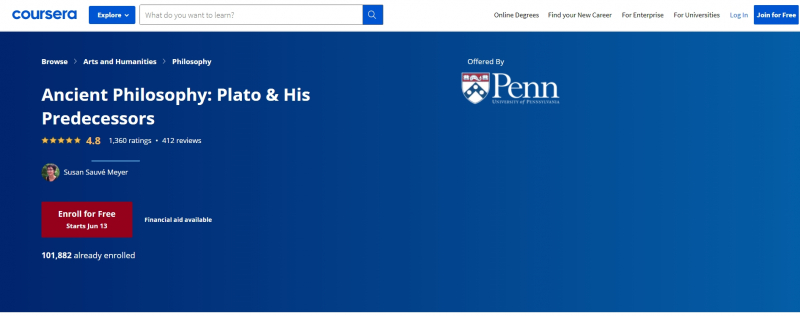
https://www.coursera.org 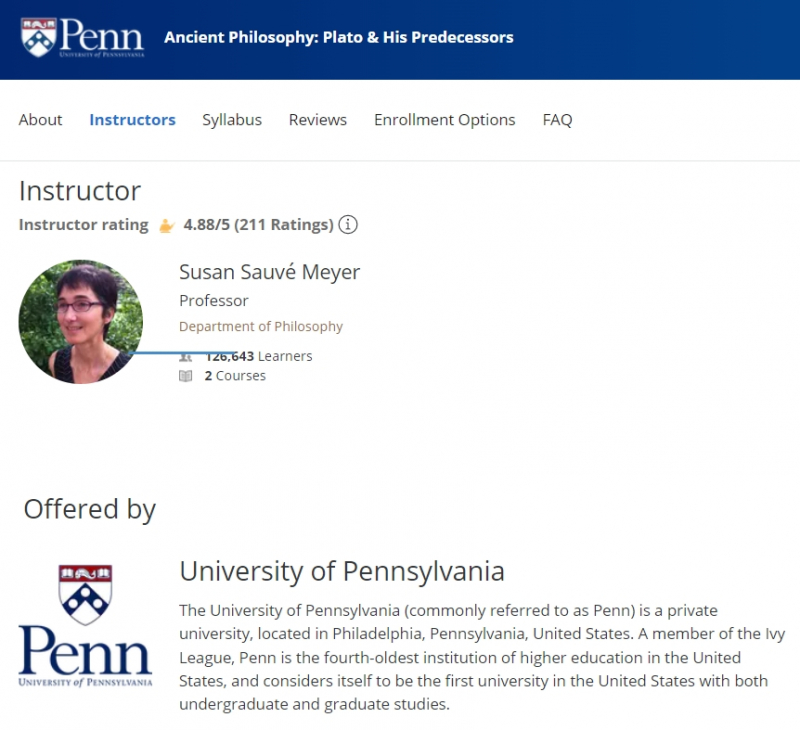
https://www.coursera.org - Flexible deadlines: Reset deadlines in accordance to your schedule.
-
Introduction to Philosophy Offered By The University of Edinburgh will expose you to some of the most important topics of contemporary philosophical research. Each session will feature a different philosopher who will guide you through some of the most pressing topics and concerns in their field. We'll start by trying to figure out what philosophy is — what are its main goals and methods, and how does it compare to other disciplines? The rest of the course will be spent getting an overview of numerous different topics of philosophy.
They introduce a companion book from Routledge, titled 'Philosophy for Everyone,' to go along with 'Introduction to Philosophy.' This course companion to the 'Introduction to Philosophy' course was prepared specifically for MOOC students by the Edinburgh Philosophy team. 'Philosophy for Everyone' includes clear and user-friendly chapters, chapter summaries, glossary, study questions, recommendations for more reading, and links to online resources. For more information, please click "Start Here" and go to the "Optional Reading" page.
This course offers:
- Flexible deadlines: Reset deadlines in accordance to your schedule.
- Certificate : Earn a Certificate upon completion
- 100% online
- Beginner Level
- Approx. 19 hours to complete
- Subtitles:Arabic, French, Portuguese (European), Italian, Vietnamese, Dutch, Korean, German, Russian, Turkish, English, Hebrew, Spanish, Romanian
Coursera Rating: 4.7/5.0
Enroll here: https://www.coursera.org/learn/philosophy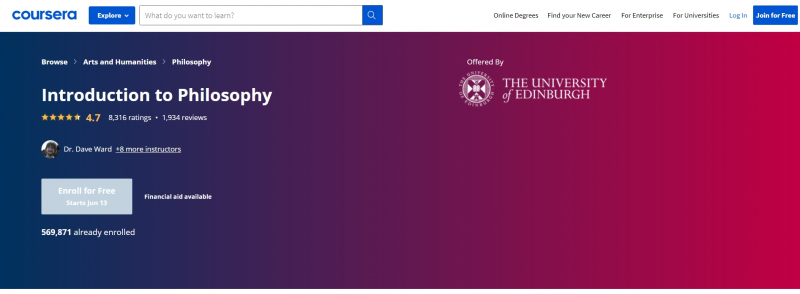
https://www.coursera.org 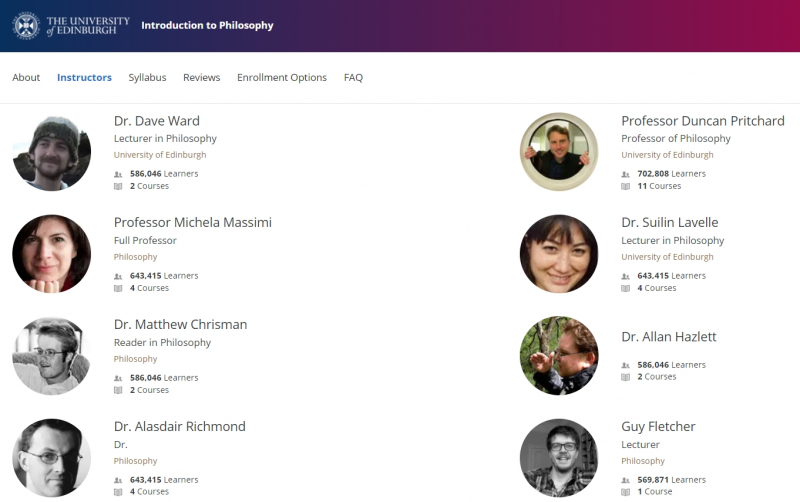
https://www.coursera.org - Flexible deadlines: Reset deadlines in accordance to your schedule.
-
Philosophy, Science and Religion: Science and Philosophy Offered By The University of Edinburgh takes the fourth position on the list of the Best Online Philosophy Courses. Three of the most essential styles of thinking about the universe and our place in it are philosophy, science, and religion. Are these modes mutually exclusive? To put it another way, is it intellectually responsible to 'choose sides' and identify with one of these approaches over the others? Or are they mutually supporting or complementary? The devil, as is common of matters of this size, is in the details. It's crucial, for example, to figure out what makes each of these methods of thinking about the world unique. Learners will look at what some of the contemporary major intellectuals in philosophy, science, and religion are actually doing in order to acquire some clarity.
The first of three connected courses in our Philosophy, Science, and Religion Online series is titled 'Science and Philosophy.' Enrollment in the first launch is now closed. In July 2018, we will introduce a new edition of the course.
This course offers:
- Flexible deadlines: Reset deadlines in accordance to your schedule.
- Certificate : Earn a Certificate upon completion
- 100% online
- Beginner Level
- Approx. 15 hours to complete
- Subtitles: Arabic, French, Portuguese (European), Italian, Vietnamese, German, Russian, English, Spanish
Coursera Rating: 4.5/5.0
Enroll here: https://www.coursera.org/learn/philosophy-science-religion-1
https://www.coursera.org 
https://www.coursera.org - Flexible deadlines: Reset deadlines in accordance to your schedule.
-
Philosophy of Science Offered By University of Pennsylvania Scientists have attempted to offer us with a comprehension of the world around us over the last four centuries. Science appears to have made significant advances during this time. Is this improvement, however, real or fictitious? And, if it's true, what progress has been made? These vital concerns will be addressed during this four-week session. Scientific objectivity and failures of scientific objectivity; the self-correcting nature of the scientific community; the positive and negative influences that values can have on science; the relationship between science and religion; and the role of the public in guiding the scientific enterprise will be covered in detail.
This course offers:
- Flexible deadlines: Reset deadlines in accordance to your schedule.
- Certificate : Earn a Certificate upon completion
- 100% online
- Intermediate Level
- Approx. 12 hours to complete
- Subtitles: French, Portuguese (European), Portuguese (Brazilian), Russian, Turkish, English, Spanish
Coursera Rating: 4.7/5.0
Enroll here: https://www.coursera.org/learn/philosophy-of-science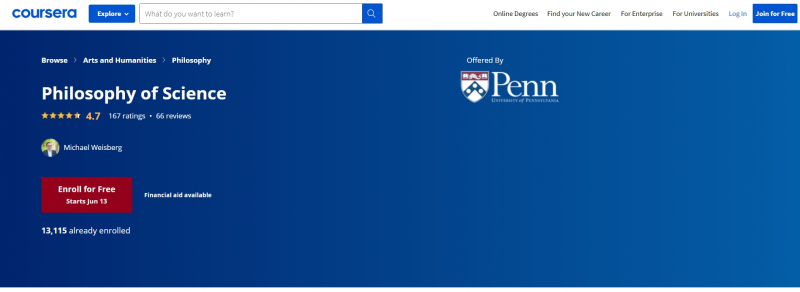
https://www.coursera.org 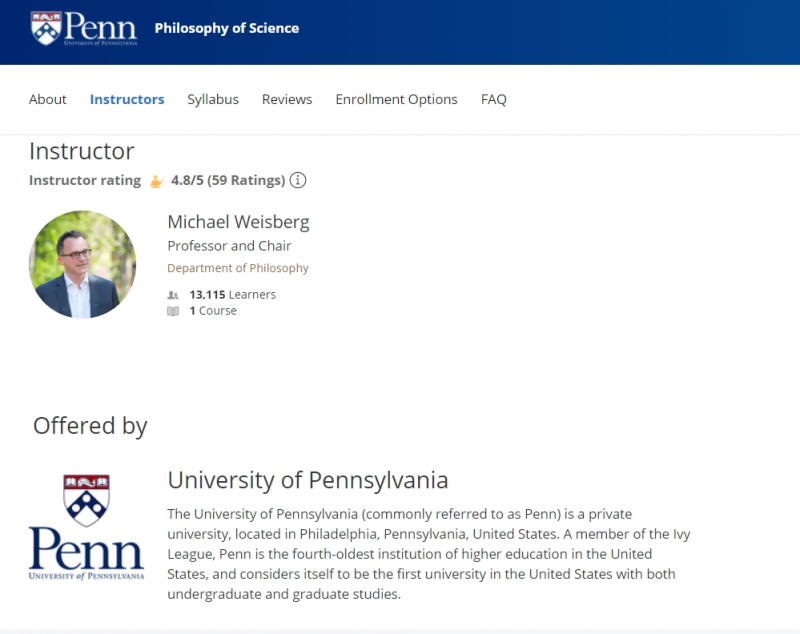
https://www.coursera.org - Flexible deadlines: Reset deadlines in accordance to your schedule.
-
With Critical Thinker Academy: Learn to Think Like a Philosopher, the instructor has consigned the teaching of logic, argument analysis, and critical reasoning to speciality courses at universities that reach too few students, too late in their education, rather than serving as the core of any rational human being's education.
In this course, the instructor will discuss what he has learned so far about these issues, with a focus on what's practical and valuable for developing as autonomous critical thinkers. There are currently over 200 videos in the course, totaling over 19 hours of viewing time! Plus a lot more! This material was culled from a range of educational resources he has created over the years, including a video podcast.
It's critical that you understand that he will continue to add videos and course modules on a regular basis. This course will continue to expand because I have SO MUCH GROUND TO COVER! THIS IS JUST THE START!Requirements:
- An interest in improving one's critical thinking skills. That's it!
Who this course is for:
- anyone who thinks that critical thinking is important and would like to learn more about it
- anyone who is required to think and write argumentatively
- anyone interested in the psychology of belief, judgment and persuasion
- anyone interested in philosophy and who would like to learn more about philosophical ideas and methods
- anyone taking a logic or philosophy class who would like to brush up on their basic logic and argumentation skills
- anyone interested in scientific debates, or the philosophy of science
- anyone interested in tribalism and contemporary politics
Subtitles:English [Auto], French [Auto], German [Auto], Italian [Auto], Portuguese [Auto], Spanish [Auto]
Udemy Rating: 4.5/5.0
Enroll here: https://www.udemy.com/course/critical-thinker-academy/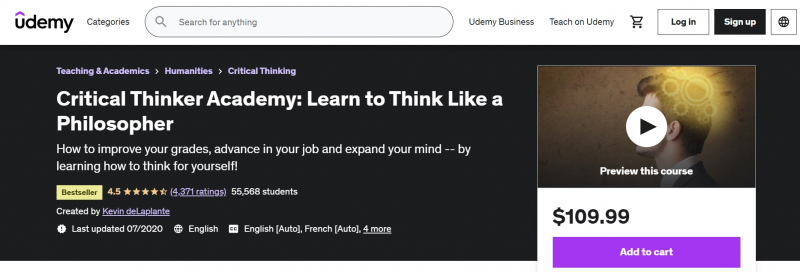
https://www.udemy.com/ 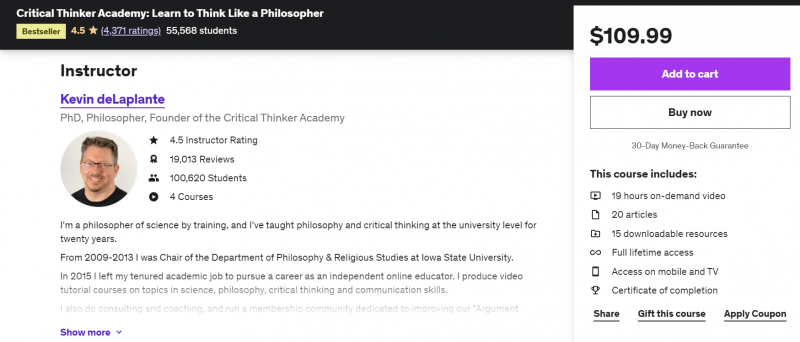
https://www.udemy.com/ -
With Introduction to Philosophy, you can learn everything there is to know about all of the major personalities and ideas in Western philosophy's history! The course is built around lectures with slides and instructor video running in the background. Following an introductory session, the book adopts an author- and discipline-focused approach, beginning in Ancient Greece and continuing to the present day. Anyone interested in a well-rounded introduction to philosophy, encompassing its primary historical writers and themes, as well as its ongoing significance, will find it useful.
Dr. Daniel O'Shiela is a philosophy postdoctoral researcher and instructor. His philosophy education took place mostly at the Husserl Archives at the KU Leuven in Belgium, where he earned his PhD in 2016. With competence in phenomenology and existentialism, as well as initiatives and publications in philosophical anthropology and psychology, philosophy of technology and social philosophy, and environmental philosophy and ethics, he has a wide variety of philosophical interests.
Requirements:
- Just an interest in learning about philosophy.
Who this course is for:
- Anyone interested in an introduction to philosophy.
Subtitles: English
Udemy Rating: 4.5/5.0
Enroll here: https://www.udemy.com/course/introduction-to-philosophy-dos/
https://www.udemy.com 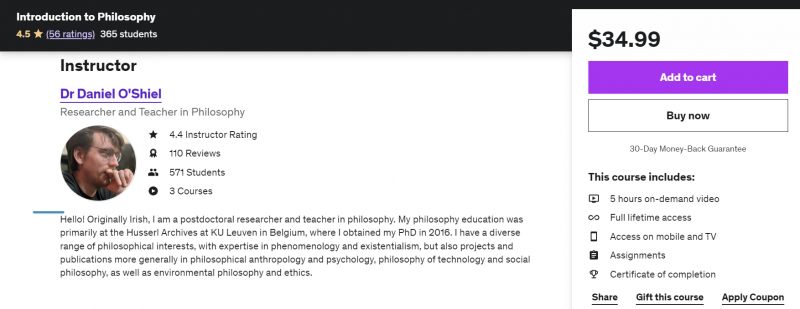
https://www.udemy.com -
Philosophical questions of what it means to be human are explored in Philosophy of Mind. It asks, among other things, if we are two things: body and spirit, or if we are merely one. It questions if science can explain consciousness and what function it plays in our lives. It aims to identify the correct analogue for humans: are we biological devices piloted by our spirits, or do we handle problems like computers? It examines if we are special, or if the rising sophistication of robots demonstrates that complex beings like us may be built using physical components. This course is for you if you've ever thought about the underlying nature of what it means to be human.
Because this is an introductory course, it starts with a review of key terms in philosophy of mind. The following section discusses Descartes' Substance Dualism, as well as some of the arguments against it. The final portion looks into Property Dualism, a recent version of Descartes' philosophy, and some of the problems with it are discussed. Physicalism, the belief that we are nothing more than our bodies, is discussed in the fourth part. Physicalism's different varieties are discussed, as well as the challenges associated with each.
Requirements:
- This course is suitable for beginners
Who this course is for:
- Those studying for interest
- Those working toward an A Level in Philosophy
- Philosophy teachers looking for new ideas for teaching the material
Subtitles: English
Udemy Rating: 4.7/5.0
Enroll here: https://www.udemy.com/course/introduction-to-the-philosophy-of-mind/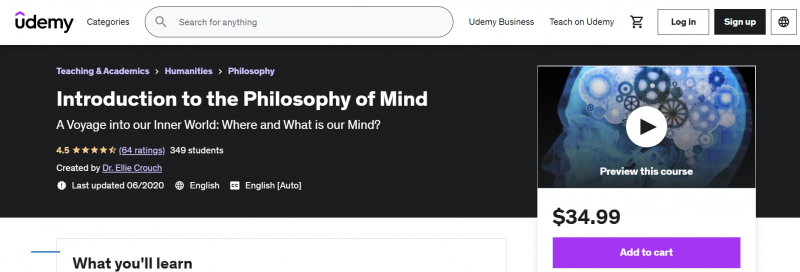
https://www.udemy.com 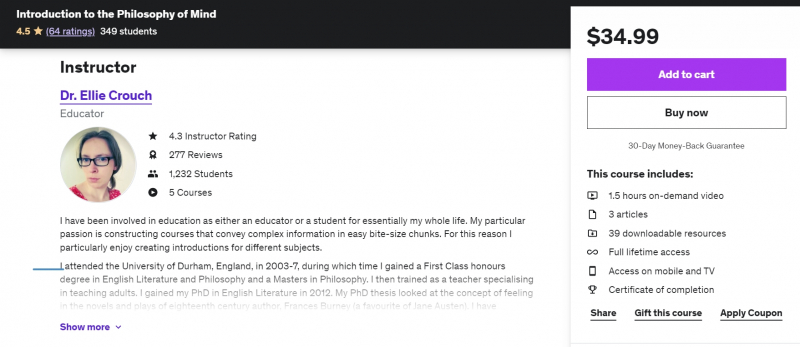
https://www.udemy.com -
This course provides a basic introduction to Moral Philosophy for people who have never studied the subject previously. It will appeal to people who are just interested in the subject; those who want to take an A level in Philosophy; and those who teach the subject and are looking for new ways to explain various concepts.
It focuses on utilitarianism, deontology, and virtue ethics, which are the three primary normative ethical theories in the Western world. From Aristotle to Kant through John Stuart Mill, it examines some of the most important figures in Moral Philosophy. It then examines how their ethical ideas might be put into reality to determine if it is ever acceptable to steal, lie, play violent video games, or murder and eat animals. The course concludes by delving into the origins of morality. Is morality a product of human psychology, or does it exist as a property of the universe? It also wonders if we're accomplishing anything more than expressing our feelings when we make moral statements.
Requirements:
- This course is suitable for beginners
Who this course is for:
- Those studying for interest
- Those working toward an A Level in Philosophy
- Philosophy teachers looking for new ideas for teaching the material
Subtitles: English
Udemy Rating: 4.2/5.0
Enroll here: https://www.udemy.com/course/introduction-to-moral-philosophy/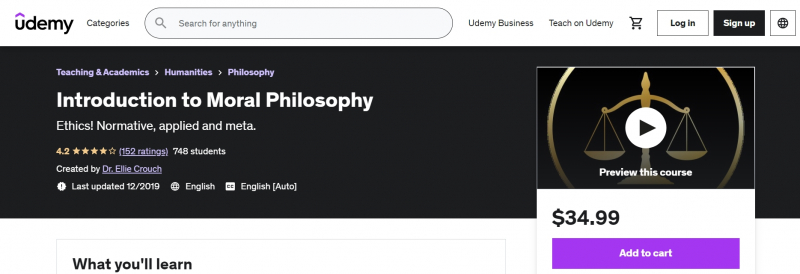
https://www.udemy.com 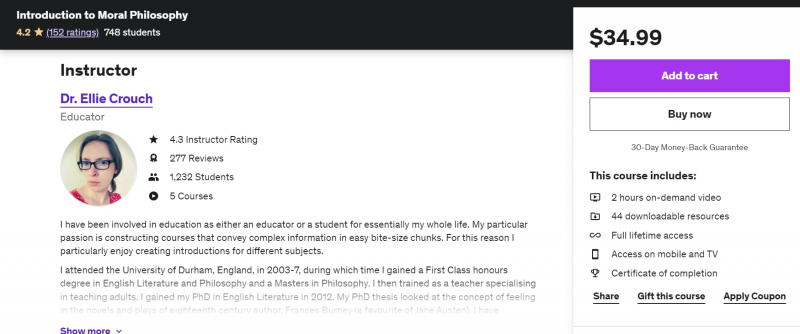
https://www.udemy.com -
Human beings have been dealing with the issues of survival, raising children, building relationships, and overcoming insurmountable obstacles on a daily basis for literally hundreds of thousands of years.
The greatest minds in history may teach us a lot about how to deal with psychological and emotional issues. They've provided us extremely detailed examples in many cases, and they've taught us how to implement these tactics in our daily lives. All of the above will be covered in this Eastern Philosophy: From Confucius to Yogananda, as well as how you can apply the teachings of some of history's greatest thinkers to your everyday life.Requirements:
- An interest in philosophy and spirituality
Who this course is for:
- Anyone looking to deepen their understanding of philosophy and spirituality in order to improve their life
Subtitles: English
Udemy Rating: 4.7/5.0
Enroll here:https://www.udemy.com/course/eastern-philosophy-from-confucius-to-yogananda/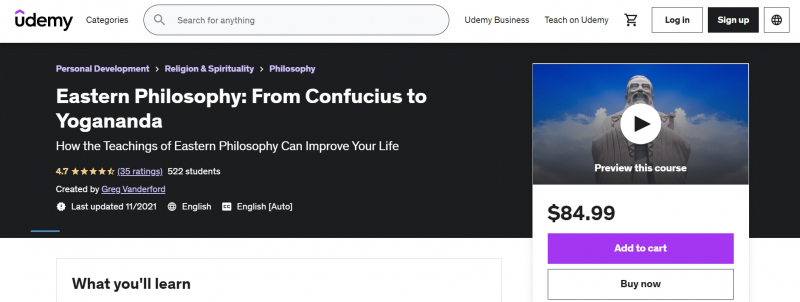
https://www.udemy.com 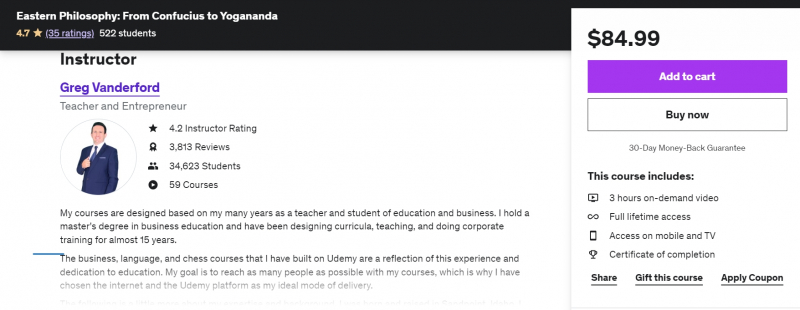
https://www.udemy.com
















